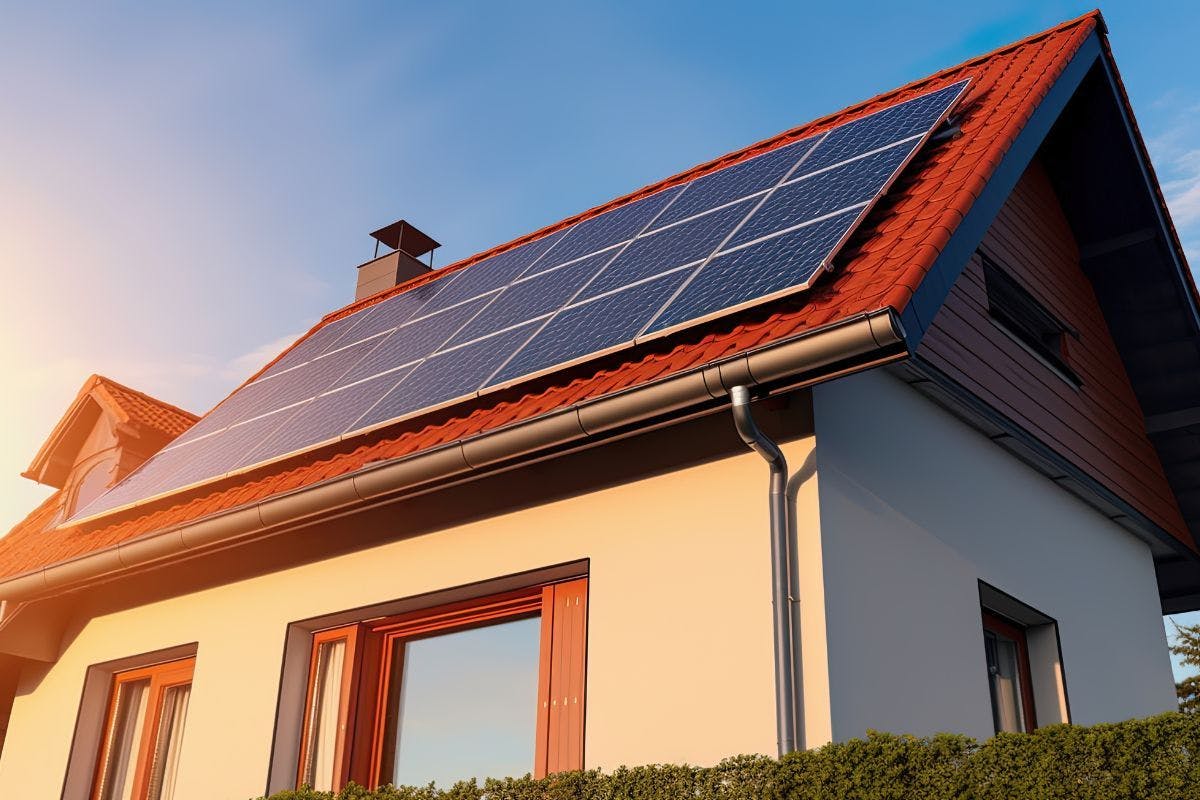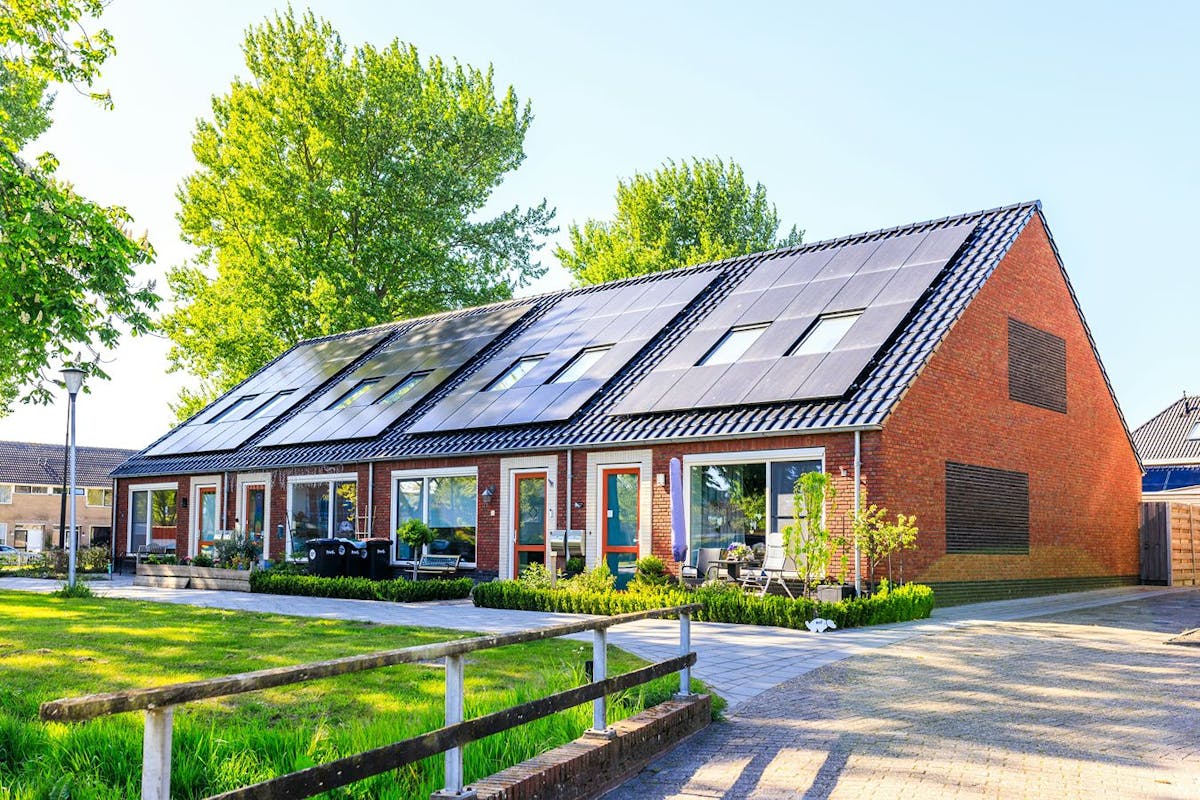Leasing vs. Buying Solar Panels: What's Best for You?
Last edited

Author
Andrew Giermak
Solar and Electrification Writer and Editor

Editor
Ryan Barnett
SVP, Policy & New Market Development

Home solar panels have a proven track record of reducing electricity bills for many people. Those savings can last as long the panels themselves: 25 years or more.
Buying and leasing solar panels are the two most common solar ways of getting solar panels at home. Each can be a great choice for the right person, and which is best for you depends on your goals and preferences. With the expiration of key tax credits for purchasing panels, leasing may grow even more in popularity. Here's how the two options stack up.
See how much you can save by going solar with Palmetto
What Are Solar Leases and PPAs?
A solar lease is a financial arrangement where the company that installs your solar panel system retains ownership, and you pay a fixed monthly amount to use the system. You'll make a monthly payment for the duration of your lease while the company is fully responsible for installation and maintenance. With this arrangement, you typically don’t pay any upfront costs for the residential solar installation, only the monthly "rent."
A solar power purchase agreement, or PPA, is like a solar lease, but your monthly payment is for the power generated by the solar panels on your roof at an agreed upon price per kilowatt-hour (kWh).
What are the differences between a solar lease and a solar PPA?
A solar lease and a solar PPA are largely the same. You enter into a contract with a solar company to have it install a solar energy system on your roof. You use the solar power the system generates, while it retains ownership.
The difference between a lease and a PPA is how you pay the solar company for that power.
- Solar lease: You pay a fixed monthly "rent" to the company for the duration of the lease, regardless of how much electricity you use.
- Solar PPA: You pay a fixed rate for the amount of electricity generated, which can vary from month to month.
Is it Better to Buy or Lease Solar Panels?
The decision to lease or to buy solar often comes down to your current financial situation and long-term housing plans. Leasing or buying solar panels can be ideal options in different situations, so you should thoroughly examine the pros and cons of leasing and buying solar panels to determine which is right for your needs.
- Buying a solar energy system outright or through a solar loan may be more suitable if you’re looking to save the most money over time or enhance the long-term value of your home for a future sale.
- Solar leasing might be perfect for homeowners who can budget for a flat monthly fee, but they don’t have the money on hand to buy the system outright or can’t secure the loan.
Pros and Cons of Buying Solar
Purchasing solar panels comes with benefits and drawbacks.
Pro: Higher long-term savings
A big reason for buying solar is the potential for higher long-term savings. Solar panel systems typically generate electricity for 25 years or more, which can reduce your monthly electric bills from the start and give you years of savings once you’re through the solar payback period, the time when the amount of money you have saved equals the amount of money you paid. A typical payback period is 7-10 years.
If you pay cash, there are no future monthly payments. If you finance, you have monthly payments but could still save money each month. Once you pay off the loan, all the additional savings are yours.
Pro: Easier to sell your home
When you own a solar panel system, it’s yours. That makes it easier to sell your home — often for more money than if you didn’t have solar panels.
Pro: Tax credits and incentives
The federal solar tax credit and some state tax credits, which can significantly lower the cost of solar panel installation, can only be claimed by the system's owner. If you lease, the solar installer gets the federal tax credit because they own the panels.
The tax credit goes away at the end of 2025, so time is running short on getting panels installed in time to claim it.
Con: Maintenance requirements
When you buy a solar panel system, any monitoring and maintenance are your responsibility. You must keep an eye on your system to ensure it functions well, and if there is an issue, you have to pay to have it fixed. That said, some companies offer real-time system monitoring and maintenance plans.
Con: Higher upfront investment
If you want to purchase a solar panel system, the initial expense can be sizable. If you decide to look into a solar loan, you typically need good financial health to qualify.
Con: More insurance coverage needed
To protect your solar energy system, you may have to increase your property coverage. That can mean higher premiums, which can increase your budget.
Pros and Cons of Solar Leasing
If you go with a solar lease, here are the benefits and drawbacks.
Pro: No upfront cost
One big advantage of leasing solar panels is the solar company bears the full cost of installation.
Pro: No tax liability needed
To take advantage of the federal solar tax credit, you need to owe federal income tax so the amount you owe can be reduced through the credit.
If you don’t have enough tax liability to use the tax credit, leasing solar panels may make more sense since the solar company can capture the value of that credit and pass along some of that savings as reduced monthly payments. These leasing tax credits are sticking around longer than those for purchasing, too.
Pro: No maintenance cost
Since the solar company retains ownership of the system, it is fully responsible for ongoing monitoring and maintenance costs.
Pro: Reduce costs and fossil fuel use
Leasing solar can help you save on your utility bill. When you use clean energy from your solar power system, you draw less power from the electricity grid, which means you use fewer fossil fuels.
See how much you can save by going solar with Palmetto
Con: Reduced savings potential
A big disadvantage of leasing solar panels is the decreased long-term savings opportunity. Since you pay the solar company every month for the length of your lease, you can save money on your energy bills, but typically not as much in the long term compared to owning.
Con: Tax credits and other incentives
The leasing company gets the tax credits and other incentives for installing solar, not you. It may pass along some of that value as lower monthly costs.
Con: No increase in property value
Since the solar installer owns the solar panels, your home doesn't get any additional value for having them on your roof.
Con: Extra steps when selling a home
Once you enter a solar lease, you have to involve the company in the process of selling your house before the lease is up.
You can buy the lease out to make it easier to sell your home, or the home buyer can agree to assume the lease. Some potential buyers may be reluctant to assume the lease, which can increase the time it takes to sell your home.
Pros and Cons of a Solar PPA
Pro: No upfront cost
Once you reach an agreement with the PPA company, it starts the installation process without you paying upfront costs. You get to start using renewable energy right away and start saving immediately.
Pro: No need or tax liability
Much like a solar lease, a solar PPA may make sense if you can’t get value out of the federal solar tax credit. (For example, if you’re retired and have no income, or are on an annuity.) The company that owns the panels can claim the tax credit and reduce your monthly payments.
Pro: Zero maintenance costs
System maintenance and repair are the installer’s responsibility. They monitor the system and fix any issues, so you can use solar power in your home without worrying about ongoing maintenance
Pro: Reduced bill
You can lower your energy bill with a solar PPA. The electricity created by the solar panels means you’re paying less to the utility company.
Pro: Cleaner energy
Because solar panels create green energy, you’re using fewer fossil fuels from the electricity grid.
Con: Lower long-term savings
You pay for the solar energy the panels produce for the length of your PPA. While you can save money compared to not having solar panels, the amount you save typically isn’t as much as if the panels were yours, especially once you would have passed the solar payback period.
Con: Long-term agreement
Solar PPAs can last for 25 years, though they may include options to buy out your system after a few years.
Con: Selling your house can require extra steps
A solar PPA can make selling your home a more complex process. Like with a lease, you may need to buy out the remainder of your contract or find a buyer who wants to take on the PPA
Con: No tax credits and incentives
The solar company gets the tax credits that typically go to the homeowner. Even if they use those tax credits to lower your payments and pass along some of the savings, they’ll still keep some of it for themselves.
| Lease | PPA | Purchase | |
|---|---|---|---|
| Who owns solar panels? | Leasing company | PPA company | You |
| Who pays for installation? | Leasing company | PPA company | You |
| Lifetime savings potential | Yes | Yes | Yes, likely highest |
| Maintenance included | Yes | Yes | No |
| Additional steps during a home sale? | Yes | Yes | No |
| Who can claim the federal tax credit? | Leasing company | PPA company | You |
Savings and tax credit eligibility may vary. Consult your own tax and accounting advisors.
Should You Lease or Buy Solar Panels?
When it comes to leasing vs. buying solar power, you should consider three things: budget, timing, and ownership.
- Budget: If you don't have enough money and/or you can’t get a solar loan, then leasing a solar system may be your best option, as you pay little or no upfront cost and it can deliver real electric bill savings.
- Timing: If your focus is on maximizing the financial benefits of installing a home solar system, purchasing a solar panel system can be the best option.
- Ownership: When you lease, the solar installer retains ownership of the system. If you wish to have total control of what happens to the system, you must purchase it.
If you’re still not sure whether buying or leasing is right for you, talk to the solar experts at Palmetto to help you evaluate your options and make the right decision. See what solar can do for you today.
See what solar can do for you:
Frequently Asked Questions
Can I rent solar panels?
You can lease solar panels in most states. Solar leases or PPAs are typically long-term agreements, lasting up to 25 years. With a lease, you pay a fixed monthly amount to use the system. With a PPA, you pay per month for the electricity your panels generate.
How much does it cost to buy solar panels?
The cost of a residential solar panel system depends on many factors like system size, available incentives or tax credits, your roof’s specifications, financing terms, and whether you’re buying battery storage. The average cost of solar panels in the US as of spring 2024 was $3.24 per watt, excluding financing and including costs such as hardware, equipment, installation, labor costs, and permitting.
Do you really save money with solar panels?
Many people can save money with solar panels, whether they buy, lease, or enter into a PPA. The amount you’ll save depends on how much electricity you use, your home’s suitability for solar, and how electricity prices change over time.
Does leasing solar panels provide tax benefits?
Typically, no. Tax benefits, such as the federal solar tax credit, go to the company that owns the panels you’re leasing. That company could pass that benefit on by decreasing your monthly payment, but your savings will be indirect and likely to be only a portion of the full incentive, credit, or rebate.
Is leasing solar worth it?
Solar leasing can definitely be worth it. A solar lease can reduce your overall cost of electricity, especially if your local cost of utility electricity increases rapidly. It’s always wise to consider all your options, but a lease can be the best for some people.
Disclaimer: This content is for educational purposes only. Palmetto does not provide tax, legal, or accounting advice. Please consult your own tax, legal, and accounting advisors.


